Poems by Carlota Caulfield from her book Los juguetes de Bertrand / Bertrand’s ToysReconocimiento Hacía bocetos. Aquí y allá una palabra. Después todo fue simple, un fuego interior que lo consumió de golpe. Al poco tiempo, un exilio impuesto. Después un cambio de fotografías y un borrón en la fecha de nacimiento. Bordes geográficos desvaneciéndose y confundidos en garabatos infantiles, y voces, voces infinitas en asedio. Esperas. Reconstruyes tu perfil y tu acento, vuelves a entrar en tu pasado, permaneces en uno de sus rincones, recorres los barrios de sus excesos, y nunca eres un huésped inoportuno, eso nunca te lo perdonarías. Recognition He made sketches. Here and there a word. Later on it was all-simple: an inner fire gobbled him up. A little later, an imposed exile, Later on, different photographs and a blotch over his birthdate. Geographic lines faded and interchanged over infantile scribbles, and voices, infinite voices laying siege. You wait. You redesign your profile and your accent, you reach the past, you settle into one of its corners, you stroll the neighborhood of your excesses, and you're not an inopportune guest, you'd never forgive yourself that. El oratorio de Aurelia La primera mirada es una mano en movimiento. Una gaveta se abre, otra se cierra, y así combinaciones imposibles del cuerpo. Un trapecio de lo familiar, del perchero y la colcha de la abuela. Cortinas donde se esconde la niñez, esas cortinas rojas del teatro, y el show del circo imaginario para mayores de ocho años. Sabiduría del acróbata y del pintor en su gotear de rojos y esos verdes y esos amarillos. Casi se pueden tocar. Entonces, los waltzes pirotécnicos, los abrigos y vestidos con vida propia, la música de acordeón, tangojazz, y trombón, eso parece. Y cuando todo se ha vuelto un Magritte, el timbre de un móvil desata una pelea violenta entre los otros, audiencia de marionetas crueles. Fin de la primera parte. Aurelia's Oratorio At first glance, it's a hand in motion. A drawer opens, another closes, and thereby impossible body combinations. A trapeze of the familiar, of the hanger and Grandma's bedspread. Curtains where childhood hides, those red curtains of the theater, and the show of the imaginary circus for those over eight. Wisdom of the acrobat and the painter in his splashing of reds and those greens and those yellows. You can almost touch them. Then the pyrotechnic waltzes, the coats and dresses coming to life, accordion music, tangojazz and trombone, that's what it's like. And when everything has turned into a Magritte, the ring of a cellphone unleashes a violent fight among the others, audience of cruel marionettes. End of part one. The poem “Aurélia’s Oratorio” alludes to the theater piece of the same name, a combination of a magic surreal show and acrobatics created and directed by Victoria Thierrée Chaplin that her daughter Aurélia Thierrée performs with extraordinary mastery and grace in theaters around the world. Nueve poemas para Charlotte 1. Agrietadas de pasión, las manos del titiritero descansan. Sólo en un pestañear, las marionetas se mueven y se confunden, y se enredan en sus cuerdas. Conmoción de un instante. 2. Dentro del armario, la sombra de un antiguo Pinocchio es una marca perenne. Así se hace la memoria y eso es lo mejor de todo, dejar que el corazón se fragmente con el tacto. Lo inexistente ha dejado un recuento. 3. Sus labios en una taza de té. Un sabor verde de Himalayas se confunde con la vasija terracota curtida por el uso. Capas y capas de residuos, testigos impregnados en el barro. Pone a un lado su diario. Mapa Mundi. 4. Su nombre reaparece en diferentes formas. En caligrafía es trazo llamado Tao. Su efímera inscripción lleva la espiritualidad de los sentidos. Digo y cuento, aunque raras veces es también toque de inscripción propia. 5. Puertas hinchadas de aguas a destiempo, como si la torrencial lluvia se hubiese vuelto un dulce y pegajozo delirio mientras observas las vestiduras extraviadas de la madera. En la ventana, una silente figura vacila. Y de pronto, el espacio de sonidos se confunde con grises, blancos y verdes. Lo de afuera entra y roza tus manos. 6. Ella, la que eres tú en ciertos días, deja un rastro de bruma y se reclina sobre varios senderos. Atrapar lo inasible se vuelve aquí furor y apatía. 7. Pasas bordeando voces. No quieres quedarte en la orilla de la muerte. Como un animal ebrio de miedo te enroscas hasta que la lluvia cese. Palabras en desorden. Trabalenguas. 8. Tú misma eres una abstracción. Todos los remedios disolviéndose. Noches de insomnio cercanas a la locura. Así tu cuerpo. Las treguas conjuradas. La parálisis un abismo de telas. La corrugada pesantez de tu espalda mancillada por bloques terapeúticos. 9. Mientras intocable hasta en la palabra, la presión de dedos y el aire denso de lugar a lugar, a tus labios coarteados les frotas unas gotas de miel y los pules como si fueran un desgarrón purpúreo. Así tus huesos, nervaduras de sombras chinescas lanzadas al piso. Tú. Nine Poems for Charlotte 1. Cracked by passion, the puppeteer’s hands rest. With only a blink, the marionettes move and are baffled, and get tangled in their cords. The commotion of an instant. 2. Inside the wardrobe, the shadow of an ancient Pinocchio is a perennial imprint. This is how memory is made and that’s the best of it all, to allow the heart into pieces if touched. The non-existent has left a trace. 3. Her lips sipping a cup of tea. A Himalayas’ green flavor is fused with the terracotta cup stained by use. Residual layers and layers, witnesses impregnated in the clay. She puts aside her diary. Mapa Mundi. 4. Her name reappears in different ways. In calligraphy it’s a pen stroke called Tao. Its ephemeral inscription carries the spirituality of the senses. I say and tell, although rarely it’s also a touch of self-inscription. 5. Doors swollen by untimely waters, as if the torrential rain had become a sweet and clinging frenzy while you observes the lost garments of the wood. In the window, a silent figure hesitates. And suddenly, the space of sounds blends with grays, whites and greens. The outside comes in and grazes your hands. 6. She, the one you are on certain days, leaves a trace of mist and bends, over several paths. Here to grasp the unreachable is fury and apathy. 7. You stroll around voices. Not wanting to remain on the verge of death. Like an animal drunk with fear you huddle until the rain stops. Words in disorder. Tongue Twisters. 8. You are yourself an abstraction. All solutions are dissolving. Nights of insomnia close to madness. So is your body. Conjured ceasefires. Paralysis, an abyss of cloths. The corrugated and heaviness of your back sullied by therapeutic blocks. 9. While untouchable even by words, the pressure of fingers and the misty air from place to place, onto your cracked lips you rub some drops of honey and you polish them like a purplish tear. And your bones, too, Chinese shadows nervures tossed on the floor. You. Bosques de Bélgica Voz suelta. Pura respiración. Labios de breves heridas. Después, un tañido. Boca sobre el metal. Voz hueca y los labios un pico abierto de pájaro. El aire es murmullos, rumores, silbidos, y marca permanente en la cámara interio. Rapidez del movimiento de la vara, privilegio de una mano. La mano tiene forma de U. Es una U. En el cielo de Berkeley hay pocas nubes, decías lentamente. Cierto, el aerófono es latón ligero, tríptico en un cuadro donde un trombón de vara parece pájaro en vuelo y alas de ángel. ¿Quién recuerda el nombre del cuadro? ¿Cómo se llamaba el pintor? Belgian Forests Voice unleashed. Pure breathing. Lips of brief wounds. Then, a note. Mouth to metal. Hollow voice and lips a bird's open beak. The air murmurs, whispers, whistles, and permanently marks the inner chamber. Rapidity of the valve's movement privilege of a hand. The hand is U shaped. It’s a U. In the Berkeley sky, here are few clouds, you were saying slowly. True, the aerophone is a light brass triptych in a painting where a valved trombone looks like a bird in flight, and angel wings. Who remembers what the painting is called? What was the painter's name? 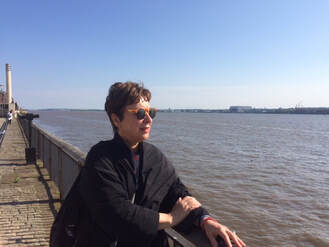 Photo by David Summer at the Mersey in Liverpool, UK Photo by David Summer at the Mersey in Liverpool, UK Carlota Caulfield is a Cuban-born American poet, writer, translator and literary critic. She has published extensively in English and Spanish in the United States, Latin America and Europe. Her most recent poetry books are Cuaderno Neumeister / The Neumeister Notebook (2016) and Los juguetes de Bertrand / Bertrand’s Toys (2019). She is the recipient of several awards, among them The International Poetry Prize Dulce María Loynaz and The Ultimo Novecento, Poets of the World. Caulfield has also published widely on Argentine poet Alejandra Pizarnik, as well as on other Latin American and Latinx poets, including Magali Alabau and Juana Rosa Pita. She is the co-editor of A Companion to US Latino Literatures (2012 &2014) and Barcelona, Visual Culture, Space & Power (2012 & 2014). She is Professor of Spanish and Spanish American Studies at Mills College, Oakland, California. Mary G. Berg, a Resident Scholar at the Women’s Studies Research Center at Brandeis University, Boston, Massachusetts, has translated poetry by Juan Ramón Jiménez, Clara Roderos, Marjorie Agosín and Carlota Caulfield and novels by Martha Rivera (I’ve Forgotten Your Name), Laura Riesco (Ximena at the Crossroads), Libertad Demitropulos (River of Sorrows). Her most recent translations are of collections of stories by Olga Orozco and Laidi Fernández de Juan.
0 Comments
Català: Hernan Cortés lluita amb dos indis by Antoni Gómez i Cros (1809–1863) Two new poems by Ivan Argüelles Historia Verdadera de la Conquista great cadavers of heat circulating like unspoken romance dialects in the ivy & to sleep in summer’s ornate diphthong yielding to the profound ampersand woven into the nexus of eyelid and sight – why go on piercing darkness with Toltec lightning riding cordilleras that differ from Spanish or Sanskrit as much as distance diverges from the porphyry of longing ? inversions of the horse and swart perspiration armor soldered to glistening herculean frames and the flotilla of imported hills charging surf the whiteness of the outer rim the deep indigo that is fatal to the eye the immensities of cobalt even as its avenues sprawl into nopal underbrush flowers fired from archaic muskets like troops of cloud-elephants prepared to seize the continent blinding whatever passes for light in the gloaming boomerang and volcano and ninety-degree alcohol when skies did battle with skies ! the ungovernable envelope of siglo de oro with its plethora of misdirected synonyms shepherds and avatars of lazar-house gods the unique digit that transforms sound into space echo after echo of an unheard Basque consonant ready to detonate the lacerated backside of Cuba the life of the ear and its golden assonance in the rushing welter of oceans on the other side of the perforated and pearly Lobe ringing syllabic disunities in rock and moss mufti and corduroy of the managerial knees sequences of traffic racing the invisible storms of Tampico where gun-runners and affidavits of bright toxicity lounge half-drunk in the ravaged tropical greenery saliva and boredom of the new ruling class borrowed gypsum thoughts heaving mountain-peaks dialects of Chapultepec childhoods the works hobbling with Franciscan mountebanks from the Old Country gringo hospice dereliction of the Carretera Panamericana where it is always the summer of 1953 BCE when the twins besieged the Popol Vuh motel ransacking dust and brick the bath of fame inches within the insect who bears History on its carapace and corn fields planted with munitions and the unending Communist Revolution of Cuauhtémoc the motor buried deep in Xochimilco floral beds water follows water into the reverse of the leaf whose exhausting idiom divides night into the multiple hemispheres of Oblivion 10-14-20 LAS AZOTEAS DE TENOCHTITLÁN half way through time in the center of space all directions go from the meridian straight north avoiding south where the dead thrive on monosyllables and the third hemisphere of time is shortened by the inch of light it takes to cross sleep’s boundaries mortals puzzle over birth and etymologies the eye’s memories are a confused reticulation a brief phase in eternity’s unfinished ant-hill dark labyrinth of coagulated stars and waters spectral resonance of the unfinished noon of marble when nothing moves but an incremental shimmer glare and intimation of a sun too soon blackened by coruscating elements of an aggravated city traffic of bacchants and hieroglyphs totem Spaniards who have left behind Galatea and her phantom shepherds for the colossal gold bricks and unstemmed tide of silver for the canals of sacred sewage Aztec immolated stone the top and pinnacle of a single multicolored plume signaling the end to the first day of a tropical infinity bulwark of crescent shaped frogs hidden in San Ángel the possibility that a new year might begin at last frame of water shivering Toltec vowels embossed in a mental armor the blaze and rutilation of horses climbing bone masses and the bruited nonsense of cadavers by the thousands left to be counted by augurs who imitate almanacs and friezes depicting enormous Revolutionary symphonies memory of children left to dry on rooftops with bleached linens sacrosanct rags panoply of rust and sugar skulls deaths by the hundreds with tiny horns blowing hats and wings terrific parades of cinematic automobiles Dolores del Rio the saint who ate the pyramids the offal of transgression mimics and sinners liars at the wheel Porfirio Díaz fading in the photograph of the Volcano and its slattern wives gesture of a phonetic pistolero to gain his daily share bread divided into fractions of oxygen and kneeless penitents of Guanajuato looking for the Surgeon of Nayarit who will soon be knocking at the door flummoxed and insensate with pulque the famous red margin of the Hours draping the pharmacy windows and the blow-out of night furious and intellectual the dialectic of darkness smoke and unending neologisms about the Life eternal to be sought somewhere in El Norte fiction of Hollywood countless abandoned motors and skins the frontera where the scales of justice tilt gagging on days-old urine cycles of pathos and iceberg lettuce spine chilling dreams recollecting the azoteas de Tenochtitlán Chabela and her amazing ink-spent hair the wind that takes its ropes and ties them around the Cathedral lifting from earth the archaic architecture of oblivion while worms with the mistaken eyes of devastated gods who live on cigarettes and cerveza in cantinas of peeling wallpaper and fly-swatters create words circular and soundless echoes tinny subtractions discarded illegible typescript on onion skin History 10-19-20 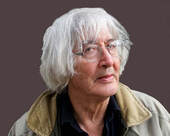 Ivan Argüelles is an American innovative poet whose work moves from early Beat and surrealist-influenced forms to later epic-length poems. He received the Poetry Society of America’s William Carlos Williams Award in 1989 as well as the Before Columbus Foundation’s American Book Award in 2010. In 2013, Argüelles received the Before Columbus Foundation’s Lifetime Achievement Award. For Argüelles the turning point came with his discovery of the poetry of Philip Lamantia. Argüelles writes, “Lamantia’s mad, Beat-tinged American idiom surrealism had a very strong impact on me. Both intellectual and uninhibited, this was the dose for me.” While Argüelles’s early writings were rooted in neo-Beat bohemianism, surrealism, and Chicano culture, in the nineties he developed longer, epic-length forms rooted in Pound’s Cantos and Joyce’s Finnegans Wake. He eventually returned, after the first decade of the new millennium, to shorter, often elegiac works exemplary of Romantic Modernism. Ars Poetica is a sequence of exquisitely-honed short poems that range widely, though many mourn the death of the poet’s celebrated brother, José. Día de los Muertos 2020Max and his uncle Joedeath’s many signatures in Sicily’s quicksilver seas the moon and its argent micronauts uncounted in the recesses of Sierra Madre actors with faces of timeless burros named Cárdenas foraging in sugar cane coldness at the center of the sun seventeen years or forty-nine years the instant is the same for whatever happens the body is only the thought of the body incense and wharves of the conquistadores liana and ivy snares at the hour’s second end how often this occurs and cannot recall the why and which the who and wherefore the canals of Tenochtitlán lose their way among withered rooftop garlands I remember nothing after pushing the green button but salutes of armless angels the rose through which a river pours and summers that belong to memory’s only syllable and heat the roar of Aetna’s ovens twenty marigold flowers Narcissus and Hyacinth eye and pulp of repercussion blindness of water and depths where night’s riddle threads an unheard harp calacas y calaveras ! thousands at play with missing fingers nameless deities in a single afternoon making rosaries of light smoke snaking through vowels of perpetuity toys that imitate sleep’s small noises tender the hair that falls around the wing shimmering hues of nacre consonants why is speech so difficult today ? colibrí ! ruby-throated messenger of death clouds the size of silence and glass motion and gravity have lost all sense evening fades in the vestibule of echo one hand seeks the other in an abyss of shape darkness of words dos mariposas de la noche ! 11-01-20 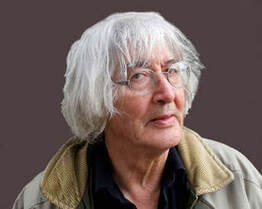 Ivan Argüelles is a Mexican American innovative poet whose work moves from early Beat and surrealist-influenced forms to later epic-length poems. He received the Poetry Society of America’s William Carlos Williams Award in 1989 as well as the Before Columbus Foundation’s American Book Award in 2010. In 2013, Argüelles received the Before Columbus Foundation’s Lifetime Achievement Award. |
Archives
July 2024
Categories
All
|
Donate and Make Literature Happen
is published by the Somos En Escrito Literary Foundation,
a 501 (c) (3) non-profit, tax-exempt corporation. EIN 81-3162209


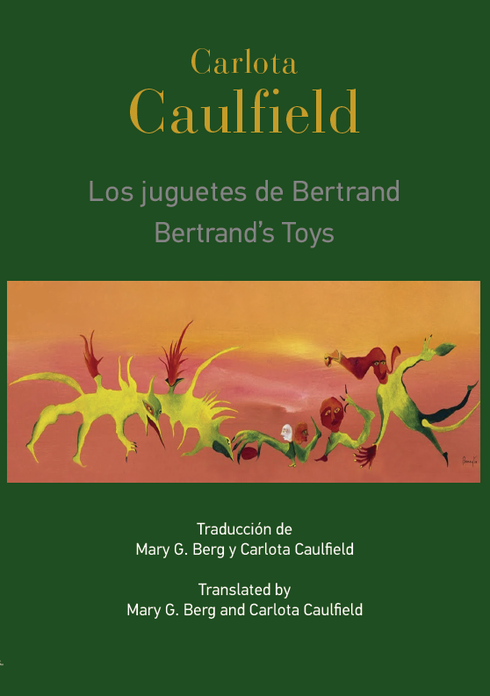
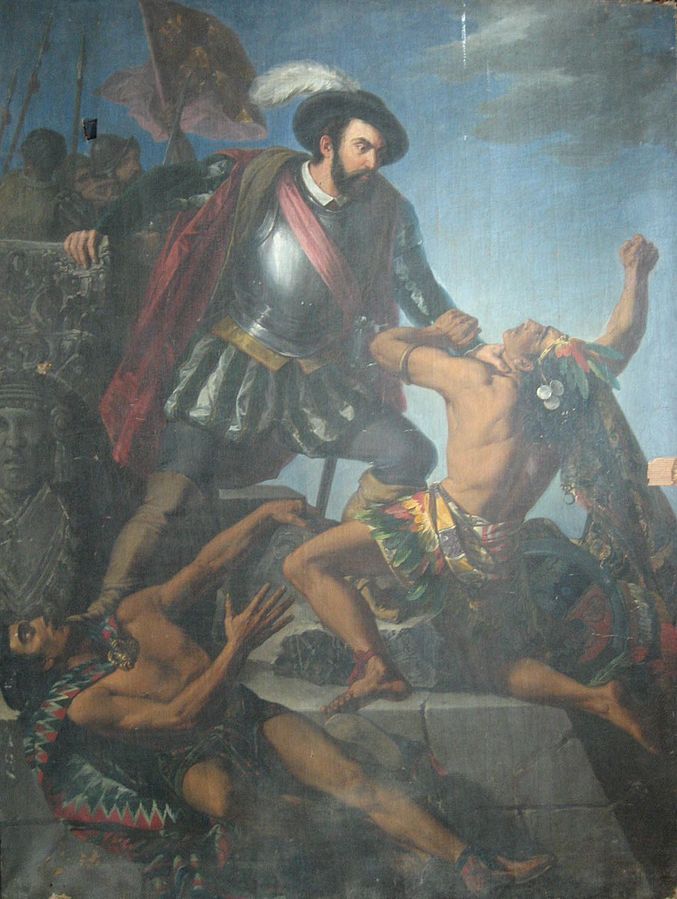
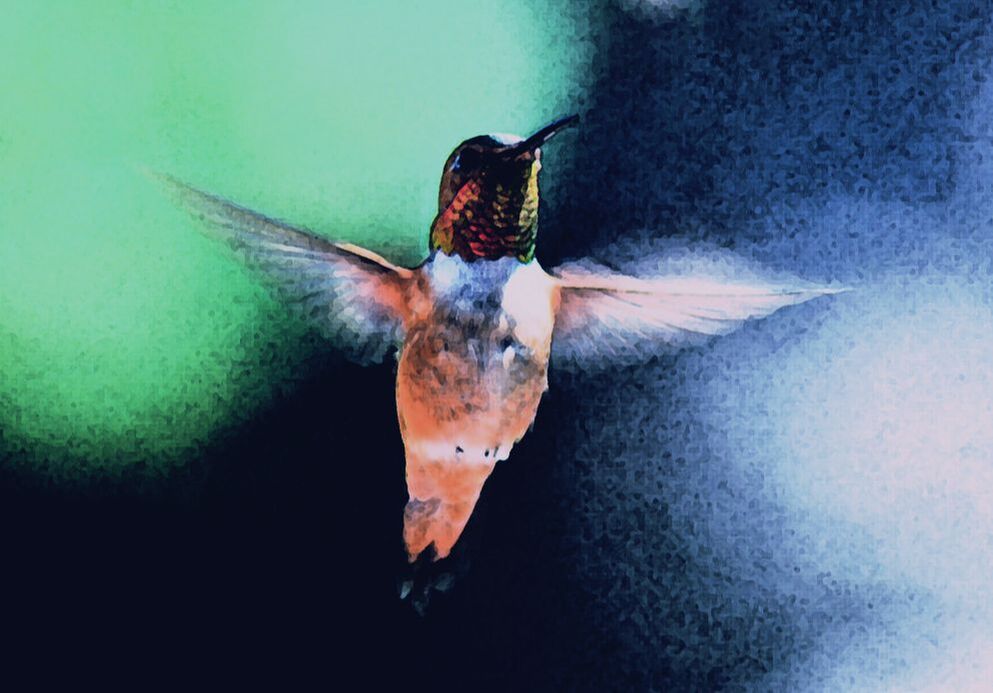
 RSS Feed
RSS Feed